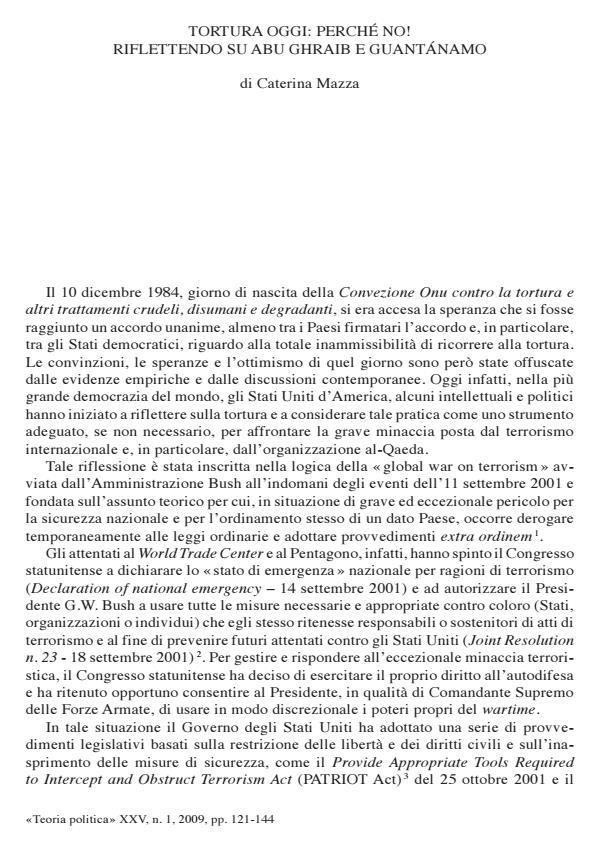Tortura oggi: perché no! Riflettendo su Abu Ghraib e Guantànamo
Titolo Rivista TEORIA POLITICA
Autori/Curatori Caterina Mazza
Anno di pubblicazione 2009 Fascicolo 2009/1 Lingua Italiano
Numero pagine 24 P. 121-144 Dimensione file 203 KB
DOI 10.3280/TP2009-001006
Il DOI è il codice a barre della proprietà intellettuale: per saperne di più
clicca qui
Qui sotto puoi vedere in anteprima la prima pagina di questo articolo.
Se questo articolo ti interessa, lo puoi acquistare (e scaricare in formato pdf) seguendo le facili indicazioni per acquistare il download credit. Acquista Download Credits per scaricare questo Articolo in formato PDF

FrancoAngeli è membro della Publishers International Linking Association, Inc (PILA)associazione indipendente e non profit per facilitare (attraverso i servizi tecnologici implementati da CrossRef.org) l’accesso degli studiosi ai contenuti digitali nelle pubblicazioni professionali e scientifiche
Torture today: Why not. Reflections on Abu Ghraib and Guantanamo - The empirical evidences and the contemporary discussions get into question the total inadmissibility of torture which has been arranged and fixed on December 10, 1984 by the UN Convention against Torture and Other Cruel, Inhuman and Degrading Treatment or Punishment. In fact, in the present time, several US scholars and politicians argue about the possibility to use torture as an adequate instrument to face the grave threat of international terrorism. Thinkers, for their convictions and analysis, part into two opposite positions: "utilitarian" and "absolutistic". The former is based on the Schmittian theory of emergency and on the idea that torture, a wrong practice in itself, can be justifiable if useful instrument to reach a morally higher "good" or to prevent an ethical worse "evil". The latter is grounded on the Kantian imperative as a guide for human choices. By this point of view, torture is absolutely and categorically unjustifiable, also in presence of a great threat for national security. Which reasoning and purposes support the US scholars in this reconsideration of torture as a tool of democracy? Which the actual consequences of these theoretical reflections?;
- (Re)interpreting Human Rights: The Case of the “Torture Memos” and their Translation into Italian Anna Romagnuolo, in Humanities /2014 pp.313
DOI: 10.3390/h3030313
Caterina Mazza, Tortura oggi: perché no! Riflettendo su Abu Ghraib e Guantànamo in "TEORIA POLITICA" 1/2009, pp 121-144, DOI: 10.3280/TP2009-001006